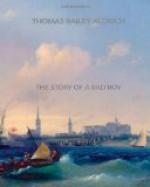The ship seemed quite proud of being left to take care of itself, and, with its huge white sails bulged out, strutted off like a vain turkey. I had been standing by my father near the wheel-house all this while, observing things with that nicety of perception which belongs only to children; but now the dew began falling, and we went below to have supper.
The fresh fruit and milk, and the slices of cold chicken, looked very nice; yet somehow I had no appetite There was a general smell of tar about everything. Then the ship gave sudden lurches that made it a matter of uncertainty whether one was going to put his fork to his mouth or into his eye. The tumblers and wineglasses, stuck in a rack over the table, kept clinking and clinking; and the cabin lamp, suspended by four gilt chains from the ceiling, swayed to and fro crazily. Now the floor seemed to rise, and now it seemed to sink under one’s feet like a feather-bed.
There were not more than a dozen passengers on board, including ourselves; and all of these, excepting a bald-headed old gentleman—a retired sea-captain—disappeared into their staterooms at an early hour of the evening.
After supper was cleared away, my father and the elderly gentleman, whose name was Captain Truck, played at checkers; and I amused myself for a while by watching the trouble they had in keeping the men in the proper places. Just at the most exciting point of the game, the ship would careen, and down would go the white checkers pell-mell among the black. Then my father laughed, but Captain Truck would grow very angry, and vow that he would have won the game in a move or two more, if the confounded old chicken-coop—that’s what he called the ship—hadn’t lurched.
“I—I think I will go to bed now, please,” I said, laying my band on my father’s knee, and feeling exceedingly queer.
It was high time, for the Typhoon was plunging about in the most alarming fashion. I was speedily tucked away in the upper berth, where I felt a trifle more easy at first. My clothes were placed on a narrow shelf at my feet, and it was a great comfort to me to know that my pistol was so handy, for I made no doubt we should fall in with Pirates before many hours. This is the last thing I remember with any distinctness. At midnight, as I was afterwards told, we were struck by a gale which never left us until we came in sight of the Massachusetts coast.
For days and days I had no sensible idea of what was going on around me. That we were being hurled somewhere upside-down, and that I didn’t like it, was about all I knew. I have, indeed, a vague impression that my father used to climb up to the berth and call me his “Ancient Mariner,” bidding me cheer up. But the Ancient Mariner was far from cheering up, if I recollect rightly; and I don’t believe that venerable navigator would have cared much if it had been announced to him, through a speaking-trumpet, that “a low, black, suspicious craft, with raking masts, was rapidly bearing down upon us!”




